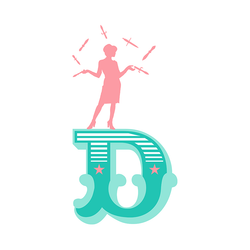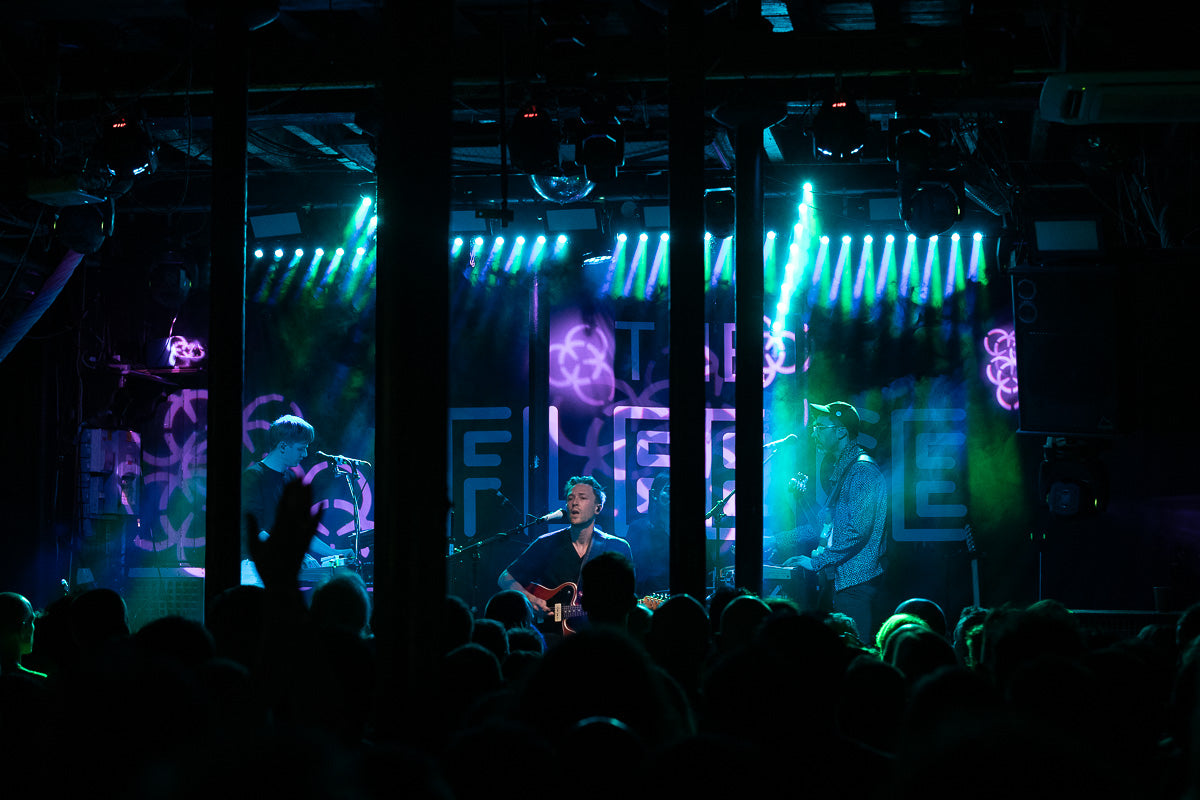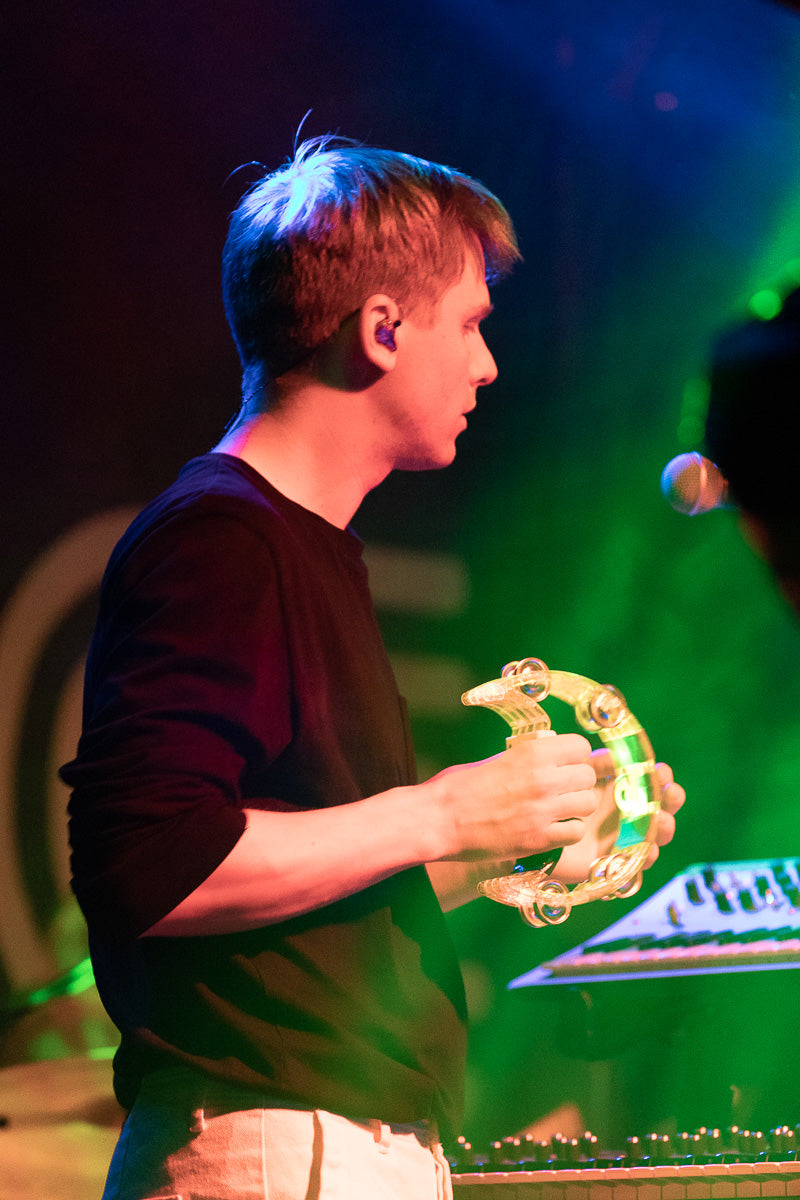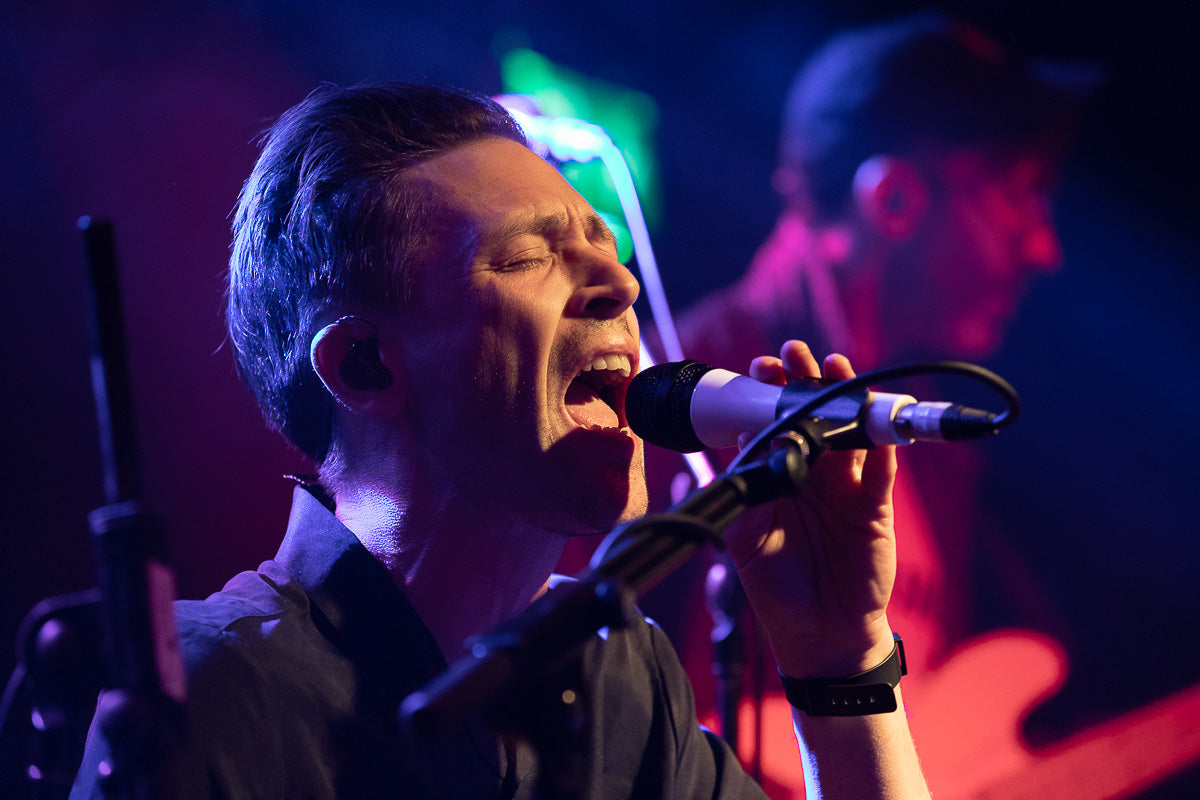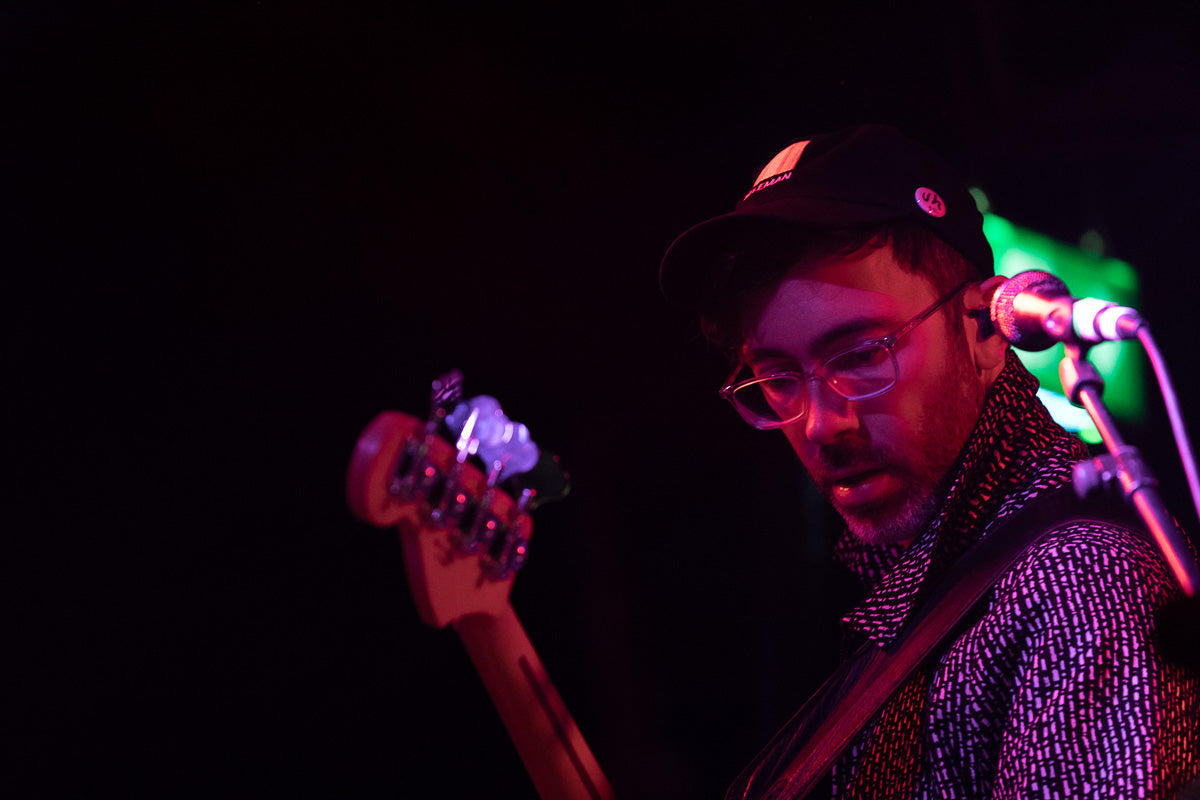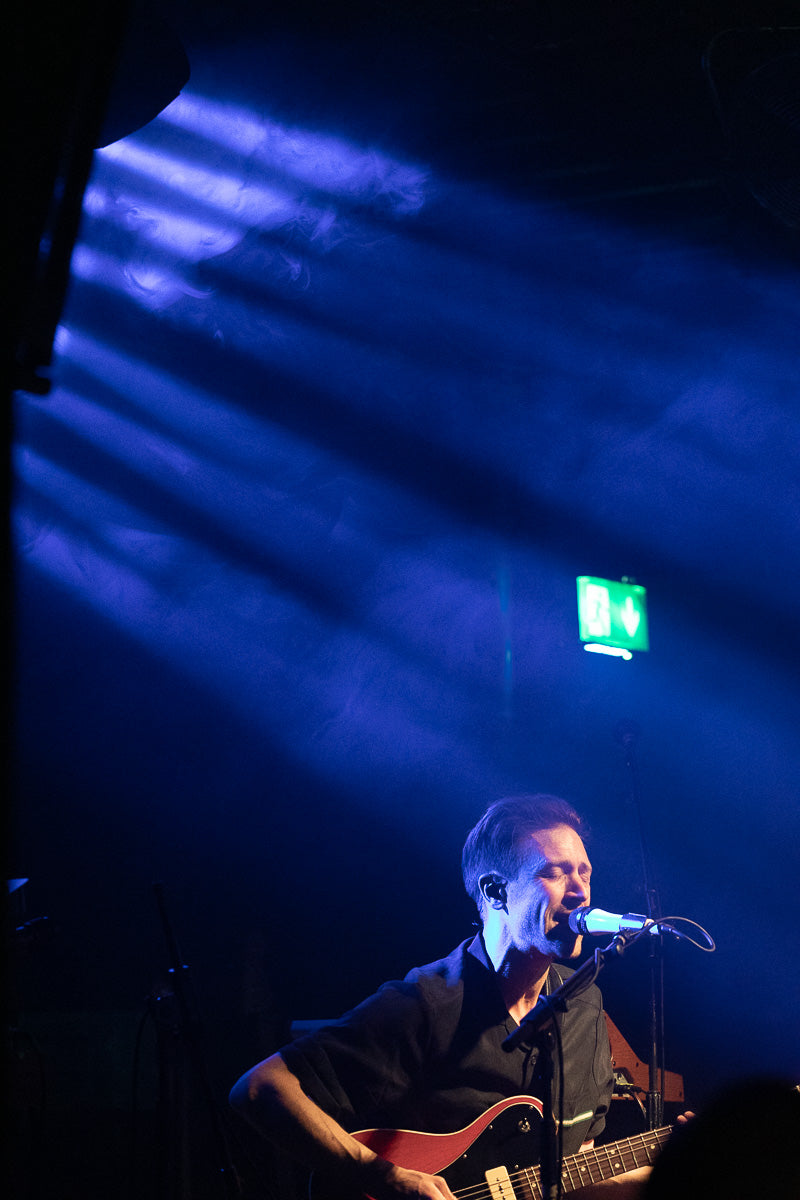Saying 'break a leg' to wish someone well before they go on stage is usually a good idea but It's probably not recommended with London four-piece Teleman, whose lead singer, Tom fell off the stage during their recent Cardiff performance, injuring his leg (26 stitches!) and resulting in an extended visit to A&E until 3am the next day; which also happened to be the same day that Mr Dagger (I don’t call him that in private, honestly!) and I were set to interview the band and take a few photos of their gig at The Fleece in Bristol.
We had already bought tickets (although it’s always nice to be on the guest list, thank you Teleman) and had seen them play in Oxford six months previously, which was a totally stellar gig and the most enthusiastic I have ever seen an Oxford crowd. We were therefore especially excited about this one, being in our new home (did I mention we moved to Bath in December?) and having listened to Teleman more or less around the clock since 2015.
Despite all of the above, brothers Tom (who was high on pain killers and obviously still in quite a lot of pain) and Jonny Sanders kindly gave us some time before the gig to talk about their influences, their writing style and answer a few other questions.
Nick (that’s Mr Dagger’s name) and I are big fans and listen to you a lot, and we came to see you in Oxford on the last tour. The Oxford gig we went to had a really energetic crowd for Oxford. You said it was the best crowd of that tour and I wondered if you really meant that?
Tom (lead singer & guitar): (quick to reply, and I think a bit horrified at the question!) I wouldn’t say something like that if I didn’t mean it!
We could really tell that people there were really supportive, it was sold out and one of those gigs where everyone there knew the words to every song; it was one of the best gigs I have been to in a long time.
T: I often find the best crowds are in the most unexpected cities and venues, I don’t know why that is. Cardiff [the previous night] was actually amazing
J: Coming from London you tend to think Manchester and Bristol are going to be the rowdy ones and then you get Oxford and Cardiff!
What happened with Pete and the Pirates and how did it come about that you started Teleman?
J: Three of us were in Pete and the Pirates - me, Tom and Pete [Cattermoul - bassist] - but it’s not a continuation; we just wound it down and we changed things around. [Teleman] was just the three of us to begin with and we basically just wanted to keep making music but lose what we felt were the restraints of guitar based indie music - and that didn’t mean just adding a synth, it was more like song writing and stripping everything back, it doesn’t have to have electric rhythm guitar.
Do you think indie music has had its moment?
T: 'Indie music' has always been a really difficult term and it’s stopped meaning anything really. Everyone associates it with something different - you say indie music to one person and they’ll think of one band and another person might think of something else. You could be talking about The Strokes or MGMT, and they are worlds apart but they all get bundled in to being indie music. I think jangly rhythm guitar had become a musical trope that we wanted to avoid but we also decided to just stop doing it. We didn’t have any particular mission statement.
J: No that’s the nice thing, in the new band there were no rules, there were no constraints so we could just do whatever we want, just put a drum machine on and then some bass line and that was really nice.
Does any one person lead when it comes to song writing?
J: Tom does!
T: Yeah I have since the start of Teleman, though it’s become more collaborative now.
Why do you think that is? Is it your [Tom's] personality to be more pushing things through?
T: No, not at all, my personality is probably the opposite actually. I’m not sure how it happened, I think it’s partly to do with the relationship with our label and partly to do with the fact that I write so many songs. I’ve been writing on my own for years; I’ve always struggled writing with other people and that’s probably another reason why.
So do you do it on your own and bring it to the band?
T: Yeah and that’s what we always did in Pirates, we almost never wrote together. Dave wrote a lot of the songs, he’d just bring them to the band and say ‘here are the chords’. We'd play it and we’d be like ‘yeah’ or we’d be like ‘no’ (laughs).
J: Some work like that because you can manage to write a complete song, whereas with others there’s a secondary process which is like arranging, where as a group you might extend a chorus or lose it altogether, or drop an instrument out. That’s part of the writing process as well.
Do you have any songs that you’ve laid down really quickly?
T: I’ve written plenty of songs where in the space of 15 minutes I’ve worked out all the essential parts. Not the lyrics, but the skin and bones of the song, so that it's 85% there and just needs lyrics and stuff.
T: In terms of writing and being more collaborative, on our last record it happened quite by accident. I was just playing Pete a demo I was working on (which was 'Submarine Life') but it was very short, a minute and 20 seconds long. Pete really liked it and said "Why don’t you add an instrumental section?" so he opened it up and we worked on this instrumental idea together which formed the whole danceable element of the song, the electronic stuff that comes in. That worked great, so I’d send him demos of all the tracks I'd been working on and he would do a re-work of them, with his imagining of how it might go. That’s what we did with 'Cactus' and it's quite an interesting way of working, almost like remixing.
Do you think that helps with the process? I think that sometimes if there are too many voices at once it’s hard to get to the finish?
T: Oh yeah, I’ve never understood how bands can get in a room and write together
J: It feels like there’s just no focus, I don’t know how you’d do that.
If you weren’t musicians what do you think you’d be doing?
J: We do other things as well; some of them are obvious I think. I work doing motion graphics so I’d probably be doing that full time. Hiro [Amamiya - drums] has a restaurant -
T: Well it’s not a restaurant, it’s a pop-up and at the weekends he does Japanese food which is very popular. [Hiro's pop-up is called Drumsco London and you can find it at The Haggerston and Pacific Social Club in East London]
J: I think Tom's a good cook, he’d probably garden or something I reckon.
T: I probably would - just a quiet life. I do like gardening or cooking. I don’t think any of us would answer and say we’d be an accountant, although Pete could be; he’s very good at managing stuff and he wouldn’t mind me saying that he loves spreadsheets! There’s a certain beauty to a spreadsheet...
How do you go about reaching new fans? Things have changed so much in the last ten years in terms of how you can reach people and how you get paid, with services like Spotify around. What would you say is your most successful way of reaching fans and getting them to hear your music?
J: Nowadays you can take control of social media - I can put an ad out and target it based on someone's age or where they live, and you're almost guaranteed that someone will like it.
Do you think the radio is still relevant?
T: Yeah, totally, we have a lot of love for BBC 6 Music. I think that’s played a big part in helping us. But then other things, just being creative with what you post and how you post it - whether it be 'come and find us in your town somewhere' and giving away tickets or just ‘whose shoe is this?’ - people like that kind of thing. Being creative online, and not just posting pictures of trees or whatever. We quite like Instagram live, if you’re a band it’s a great thing to be able to connect with your fans in real time. If you do that regularly people start to get into it.
Do you think the way music is delivered now (digitally) has changed things? Do you think it’s positive or would you go back to how things were if you could?
T: It’s different, the power now is in the hands of the listeners. You can choose what you want whenever you want, whereas in the past, the power was with the marketers saying ‘here’s the latest band, you’ve got to listen to it’ - you didn’t have much option.
When you were signed [by Moshi Moshi], how did they find you?
T: They came to a gig - we were supporting another band - our first or second gig I think.
J: A friend of mine was a manager and she had invited another friend, who was also a manager (from the label), to the show to see the headline band, but he preferred the support, which was us!
Are you still friends with them?
J: Yes, we’re all friends, yeah, we don’t make enemies!
(I’ll be honest; this wasn’t a serious question but Jonny gave a very serious answer and I suspect that my sense of humour might have been lost on them. But it also showed how much they value their integrity and the respect that they have for their fans and the bands that they work and/or tour with)
If you were going to recommend 3 songs to our customers who haven’t heard of you what would you pick and why would you pick them?
T: That’s a nice question (hoorah!). Probably 'Sea of Wine', from the last album, because that’s my personal favourite on the record; and 'Submarine Life' because I think that’s got a lot on interesting stuff going on.
J: Sometimes singles aren’t the most representative of the band, they're just more popular.
Which is your most popular song?
J: Probably 'Düsseldorf' (this is my favourite!) from the second album and before that, 'Cristina', which was the very first single.
T: 'Song for a Seagull' is also maybe one of the three as well because that one is going down so well live.
Tell us about your videos? Did you do your early videos yourself? (At this point Mr Dagger points out that we can see the camera operator in the mirror in the video for 'Düsseldorf'!)
J: That was a friend of ours, Daniel Brereton, who did that.
I really like 'Strange Combinations', I think that’s the first video I saw. It has a nice rough edge to it.
J: Yeah, we did that together.
T: That video doesn’t come up much but that’s actually one of my favourites as well.
It would be great to know about who you listened to growing up and how you think they’ve found their way into your music, if they have at all?
T: My earliest memory is the records that my Dad had. This was pre CDs. It was very eclectic; the ones that stuck out for me were Abbey Road, Johnny Cash -
J: Scot Joplin, some ragtime stuff.
T: It was a bit like the John Peel show! Completely random things, that was when we were really young and then, probably when I was like 10 or 11, Michael Jackson...
J: You liked Queen didn’t you?
T: Queen, yeah, I think that’s because of Mum.
J: We were never really edgy or trying to be alternative. I was into mainstream stuff in my teenage years, all the stuff that was in the charts, Britpop and all that.
T: Yeah I still love classic tunes, whether it’s Queen or MC Hammer. [U Can't Touch This] was the first tape I ever bought and I still love that song, it’s brilliant, and now my daughter listens to it and she goes absolutely mental for it! It’s funny because there was loads of stuff back then that I really like now, like Bowie and Talking Heads, but we didn’t listen to it then, that came later in life
I think it’s good when that happens though. Sometimes you listen to old things, like when we were watching an episode of Mrs Maisel a few weeks ago and ‘Cities in Dust’ by Siouxsie and the Banshees came on. I hadn’t listened to it in 20 years or more but it sounded really good because some things age well don’t they?
T: Yeah - some things that make you cringe at the time are actually classics - you listen back and you’re like ‘that’s great!'
So what’s next for you guys? Maybe some time off? (points to Tom’s leg)
T: Yeah erm just writing. All the time!
Do you know what’s coming up in terms of plans for touring?
T: Well this tour now is winding up the campaign for the Family of Aliens album so there won’t be any touring until we’ve recorded something new.
What about overseas?
J: We did some touring in Europe but we won’t be performing any more until we’ve got some new material recorded, so we’re going to go into hibernation now.
T: To deep sleep!
J: Sometimes when the album cycle runs down there’s a gap and you can get lazy, but new stuff is already happening.
When do you think that will be?
J: No idea really, but we're working on new things.
Do you think you’ll be ok tonight?
T: I’ll be ok, but I’m not sure how it’s going to go down or how easy it’s going to be...
J: It was this or cancel, and we thought maybe it's kind of endearing in a way!
T: I'm sure I can do the next two; if I’m doing tonight I'm doing the next two!
It’s not broken or anything is it?
J: It’s a flesh wound (lots of laughter and Monty Python references)
T: 'Laceration' is what the doctor said...
and on that note….
So when are we going to hear from you again?
J: I don’t want to speculate but we don’t want to hang around either. We have an album of remixes coming out in May so that’s probably when you’ll next hear from us.
T: Yeah, hopefully we’ll show our heads again later in the year or early next year
Even confined to a chair, having had 26 stitches only 15 hours ago and with the rest of the band seriously lacking sleep, the energy and enthusiasm emanating from the stage was undimmed. We had a great night, as did the rest of the crowd and we are both eagerly awaiting the remix album which is coming out on 17th May 2019.
Dolly's Picks:
Listen to Teleman on Spotify.
Visit the Teleman website and buy lots of records!
Teleman on Instagram
Teleman on Facebook
Photography by Nick Miners
